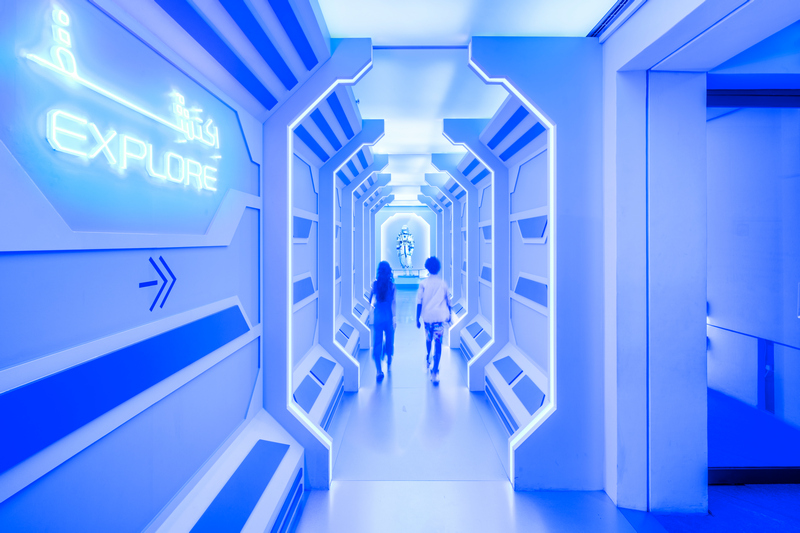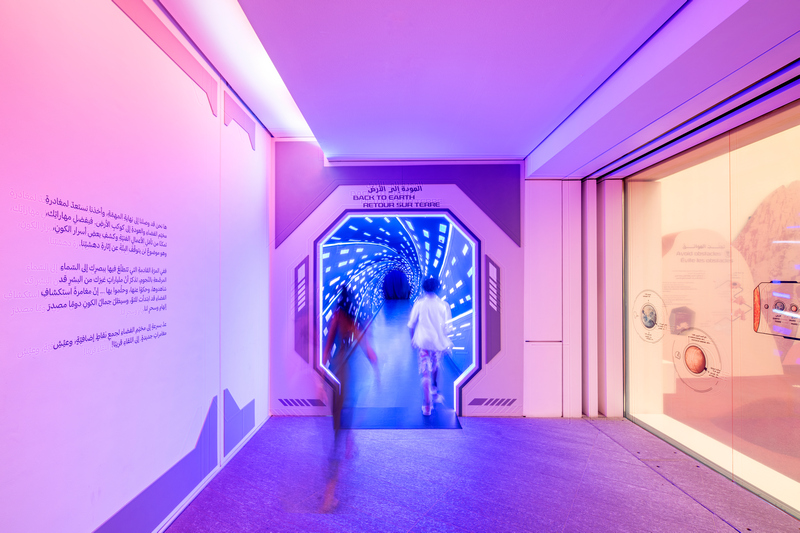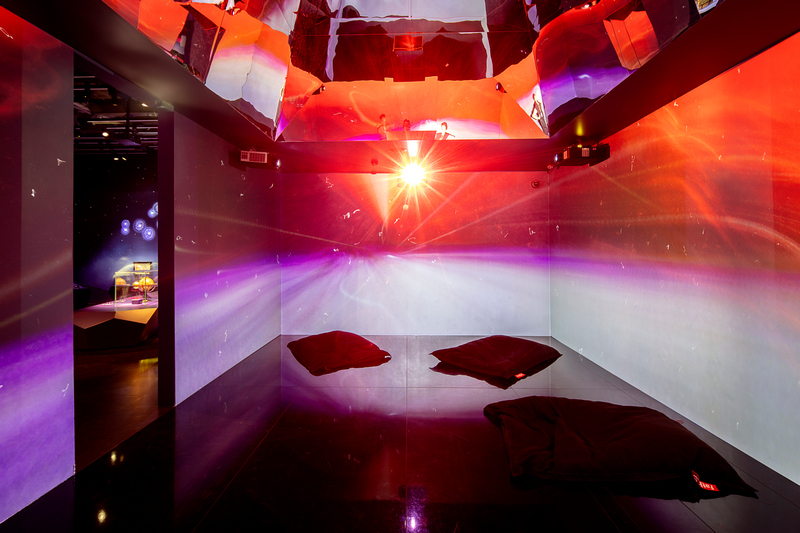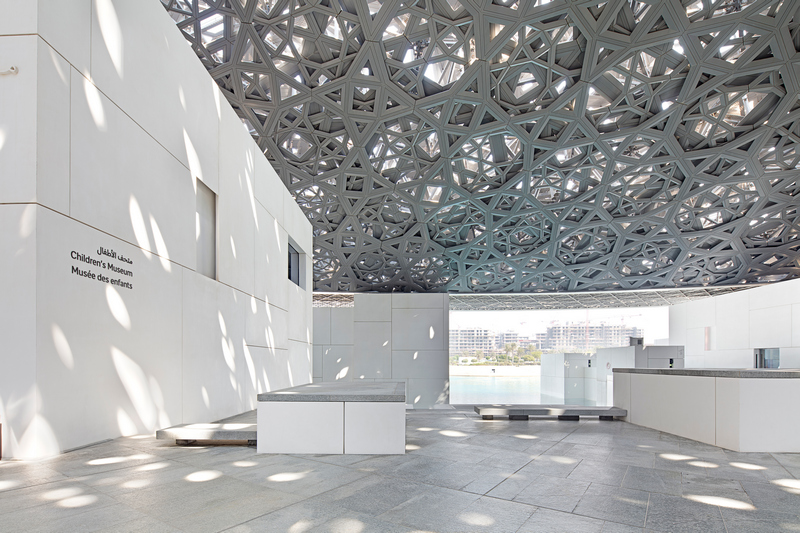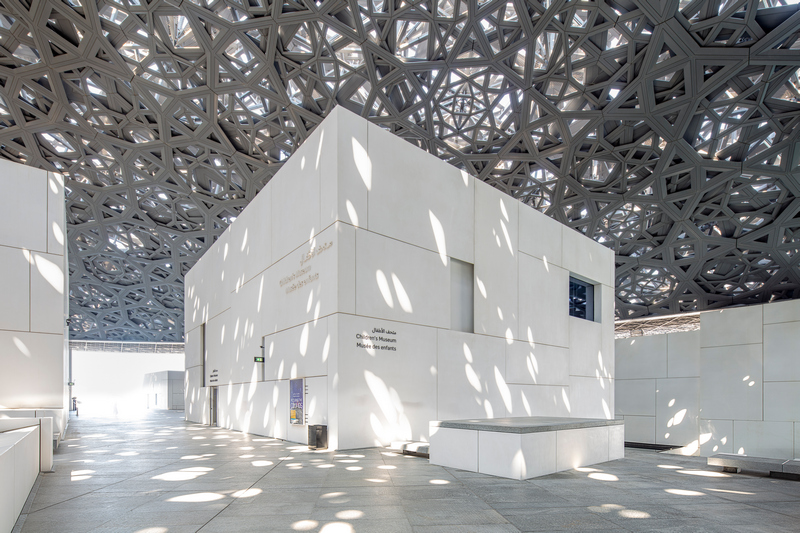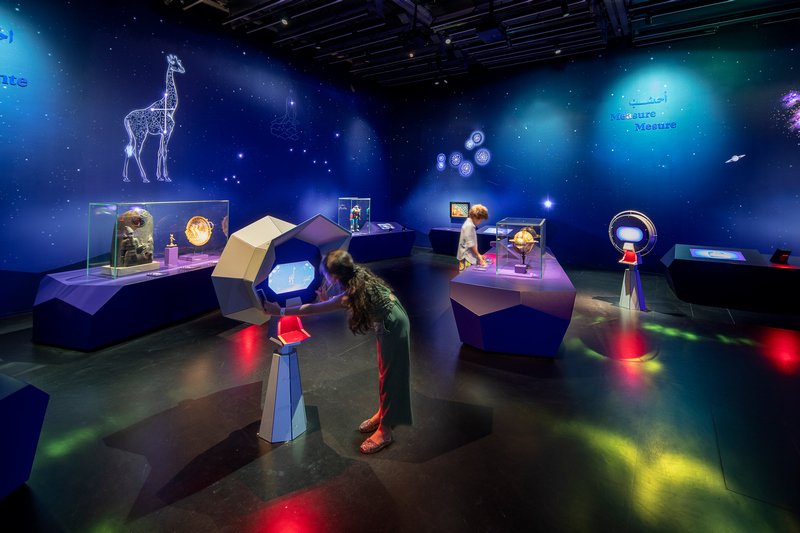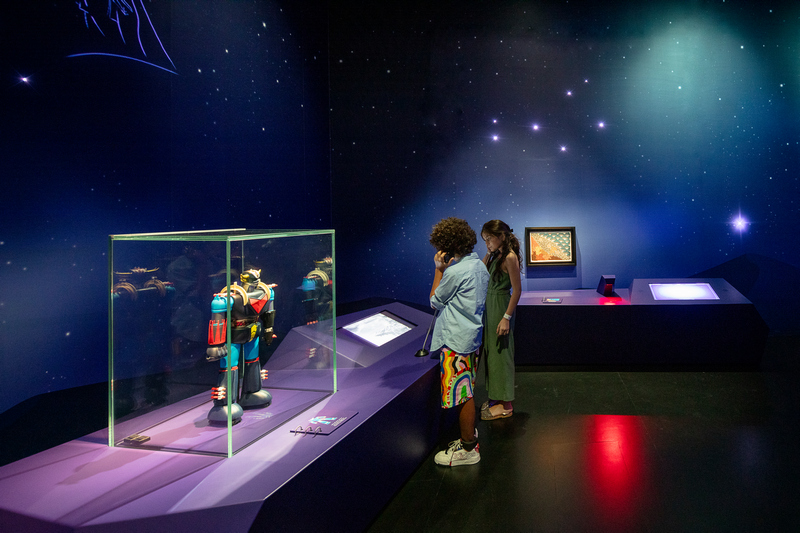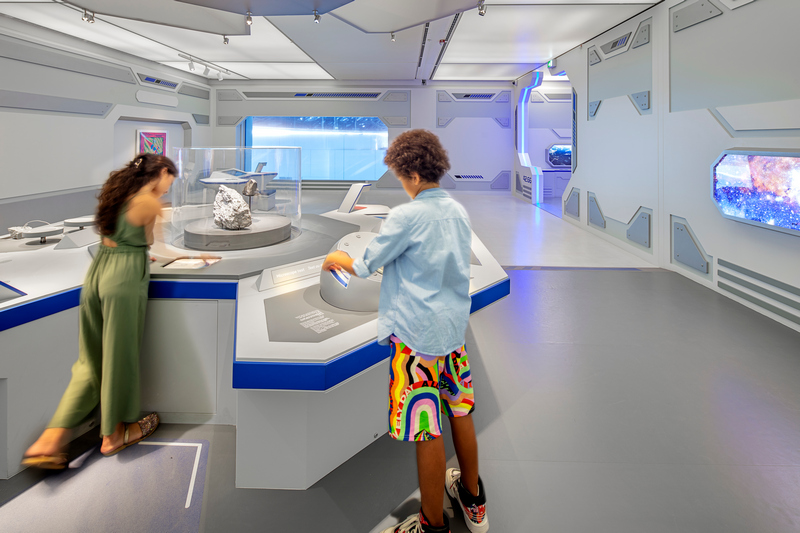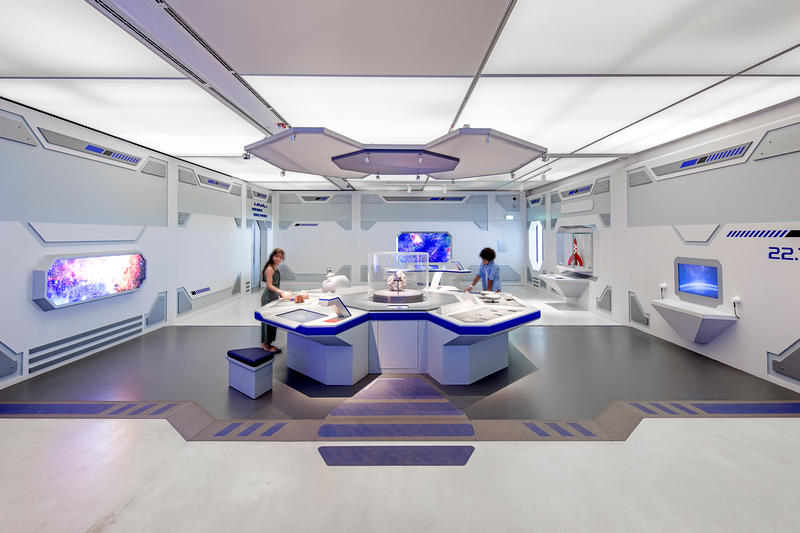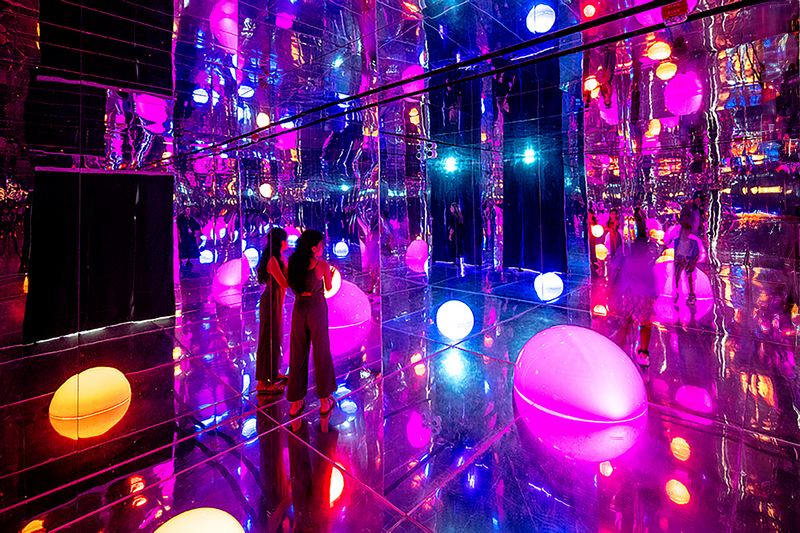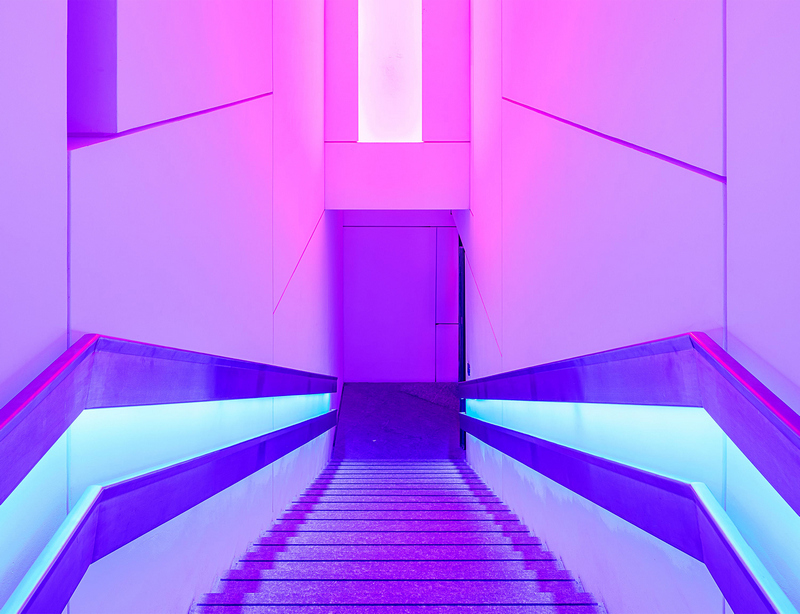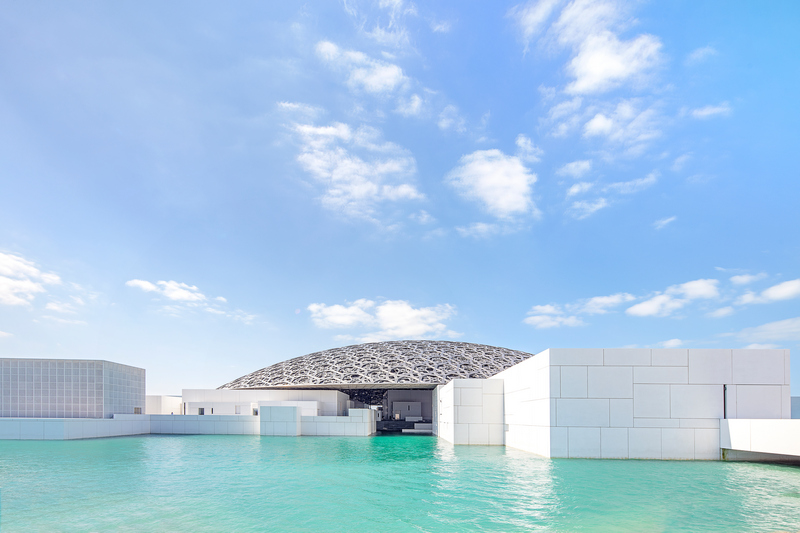The Louvre Abu Dhabi is presenting the exhibition “Picturing the Cosmos” until June 2025. It was designed by ATELIER BRÜCKNER for the children’s museum, a separate building within the iconic architecture of French architect Jean Nouvel. Through original objects, works of art and artefacts, children and young people are given access to the cosmos: playfully, scientifically, immersively – a curated experience over three floors.
Each floor is designed differently: the ground floor is dark and magical like a starry sky, the upper floor is technical and bright like a spaceship, and the basement, where Mars can be explored, is completely bathed in orange. The young museum visitors immerse themselves in worlds of experience and conquer their own knowledge: They scan their barcode wristband, answer questions and receive information according to their age group and chosen language (English, French or Arabic).
The interactive journey “Picturing the Cosmos” starts with the Cosmos Gallery on the ground floor of the Louvre Abu Dhabi Children’s Museum. Here it is all about man’s view of the heavens. Contemplate, Narrate, Measure are the three ways in which mankind appropriates the cosmos. The objects on display illustrate this. There are measuring instruments, including an astrolabe (North Africa, 1726/27) and a sextant (Europe, 19th century), as well as works of art: a 2200-year-old Egyptian stele depicting a starry sky and a Hellenistic terracotta bowl showing a solar chariot, both on loan from the Louvre in Paris. A celestial globe dated 1750 comes from the Bibliothèque National de France. The children can explore its constellations at a media station. The object labels are designed differently according to the subject area. They open like little doors to another world, can be slid open or turned over like a book.
Futuristic-looking binoculars point the young museum visitors towards celestial bodies and constellations projected onto the surrounding walls – including an aeroplane and shooting stars. The information on the display quenches their thirst for knowledge. Finally, in the centre of the room, a black box offers an immersive experience: projected stars, planets and the Milky Way, mirrored several times, convey a feeling of infinity.
The staircase, with its impressive lighting, is the prelude to your own expedition into space. The first floor, entitled “explore”, resembles a spaceship. The focus here is on space travel and related research experiments. Recorded films from an Emirati spacecraft complete the experience. The attraction is an original astronaut’s suit from the UAE Space Agency, which pulls visitors into space from the entrance.
Various research stations invite you to experiment: Children can investigate the weight and magnetism of artificial meteorites. At the “Create your own image of the sky” media table, they discover how colouring makes telescope images easier to read and can create their own image by adjusting the colour. The “Spacewalk through Infinity” also offers a playful experience: the artistically designed room installation works with backlit globes and mirrored walls. The abstract celestial bodies change colour as soon as the young museum visitors approach them.
Finally, visitors can reach the Mars Station by lift. It is located in the basement of the museum. Everything here is bathed in orange light. First, the children learn about the requirements for exploring this planet. At the “Mission Desk”, with its interactive RFID station, they can find out what missions will be possible on Mars in the future. They can then choose which of these missions they would like to carry out in the adjacent outdoor area.
The outdoor area is designed as a training ground. Here, children can playfully explore the Martian landscape with hills, obstacles, and an integrated trampoline. Analogue stations provide information about life on Mars: there is a Mars construction camp, a rover mission where rocks are collected for research purposes, and a plant station where the question is whether and how plants can be grown on Mars. The Martian landscape becomes a spatial experience: large-scale printed views surround the outer walls of the play area.
The way back to earth is through a space tunnel. The long, illuminated corridor leads to the galleries of the Louvre Abu Dhabi. Here you can continue your visit to the museum.
“Picturing the Cosmos” was developed by the Louvre Abu Dhabi in partnership with the Mubadala Investment Company, the UAE Space Agency, and the Mohammed Bin Rashid Space Centre.
With the support of France Museums, the museum has received major loans from the Bibliothèque Nationale de France, the Musée des Arts Décoratifs, the Musée du Louvre, the Musée d’Orsay, the Musée du Quai Branly – Jacques Chirac, the Musée Guimet and the Centre Pompidou. There are also loans from the Department of Culture and Tourism – Abu Dhabi (Natural History Museum Abu Dhabi), the UAE Space Agency and the Sharjah Museums Authority (Sharjah Maritime Museum).
ATELIER BRÜCKNER, as general planner, was responsible for the design of the exhibition and the overall concept. With 130 employees, ATELIER BRÜCKNER is one of the world’s leading exhibition designers. The company has offices in Stuttgart and Seoul. It creates narrative spaces for museums, brand and visitor centres. The focus is on communicating content emotionally – as a lasting experience. Museum exhibitions for children are an important part of ATELIER BRÜCKNER’s work. The Children Rainbow Land at the Shanghai Science and Technology Museum and the Junior Museum at the Rautenstrauch-Joest-Museum in Cologne opened in 2010. Between 2016 and 2019, the Nobel Foundation presented several exhibitions for children, designed by ATELIER BRÜCKNER, in Dubai. One of ATELIER BRÜCKNER’s current major projects is the Grand Egyptian Museum in Giza, which includes a 3,500 square metres children’s museum. Recently the “Future Heroes” children’s museum opened at the Museum of the Future in Dubai.













